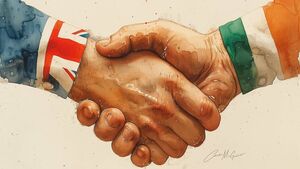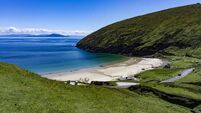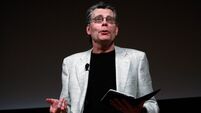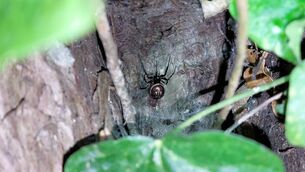Big contradiction in North’s identity conflict

The spectacle in Belfast of masked loyalists and nationalists uniting on the streets in opposition to immigration was a bizarre reminder that tribalism can be prepared with any materials you have lying around. Picture: Conor McGuire
In the annals of Irish history, we've seen many weird bedfellows, but none as strange as the recent scene that unfolded on the streets of Belfast. We witnessed the most unlikely of alliances. Staunch Ulster loyalists, their Union Jacks flowing triumphantly in the August breeze, marched shoulder to shoulder with their traditional enemy, the ‘Irish patriot’, holding the tricolour with undiminished pride. It's a scene that would have James Joyce reaching for his whisky bottle and Samuel Beckett whispering, "I can't go on; I'll go on."
This strange combination, brought together by a shared antipathy towards immigration, comes with a side of cognitive dissonance. It's as if a playwright with a ludicrous flair hijacked our national narrative's screenplay, creating a type of ‘Waiting for Godot’ where Vladimir and Estragon decide to pass the time by burning down the local kebab shop.
The irony is thicker than a bowl of Dublin coddle. Here we have the descendants of planters and indigenous, whose forefathers spent years refining the skill of mutual hatred and annihilation, suddenly finding common ground in their suspicion of the 'other'. It's like discovering that the Capulets and Montagues had put aside their feud to protest the inflow of Veronese tourists.
We would do well to remember that Ireland is a place where contradictions are as prevalent as rain. We're a country that takes pride in our 100,000 welcomes yet has a history of sending more people packing than a Ryanair flight attendant. Our diaspora has extended to every part of the world, yet we now shudder at the prospect of an influx of the world's displaced humanity.
This is a short truce in the continuous identity conflict that has defined this island for generations. Our modern tribalists have built a shaky bridge of common grievances, similar to the mythological Fionn mac Cumhaill and the Scottish giant Benandonner, who put aside their differences to build a causeway.
But what genuinely fascinates me is how this unexpected pairing illustrates the underlying currents of identity and belonging that have always flowed beneath the surface of Irish culture. It's as if, in their eagerness to reject the 'new' Irish, they've unintentionally accepted a shared 'old' Irish identity. One can almost hear Yeats' ghost whispering, "A terrible beauty is born" – except in this case, it's a terrible and opportunistic hypocrisy.
The spectacle of masked men waving opposing flags and yelling bigoted chants is reminiscent of a Beckett play performed by the cast of ‘Love/Hate’. It's a bizarre reminder that tribalism, like the convenience of an Irish stew, can be prepared with any materials you have lying around.
The opportunism of the Unionist faction in this strange partnership is especially remarkable. For decades, these Union Jack stalwarts have established their identity on a foundation of haughty isolation, as solid as Derry's walls. They've clung to their British identity like a crusty barnacle to a rock, defying the tides of change with determination that would make a mule blush. But today, as the waves of immigration crash on their shores, they find themselves adrift in a sea of uncertainty.
It's a delicious irony that those who previously prided themselves on being different from the rest of Ireland now dread becoming indistinguishable in a multicultural society. Its once smug insularity has now become its Achilles' heel. They're urgently hunting for allies to man the walls, much like a man who's lived his entire life in a fortress and discovers the drawbridge is jammed open.
This increased willingness to eat with their traditional opponents is more of a tactical retreat than a philosophical shift. It's as if they've suddenly realised that their snug antideluvian sectarian squabble is being disrupted by unwelcome guests, and they can't decide which is worse: sharing power with Catholics or sharing the street with kebab restaurants.
The Unionist community, which has long portrayed itself as a besieged minority in Ireland, now faces the potential of being one of many minorities. It's similar to the protagonist in Flann O'Brien's ‘The Third Policeman’, realising that he isn't the only dead man walking; suddenly, the elite club has become less exclusive and unremarkable.
This opportunistic collaboration reflects a basic unease within Unionist identity. For years, they've identified themselves as not being Irish, Catholic or Republican. However, when confronted with a new 'other', they struggle to define themselves. It's as if they've spent so much time staring in the mirror and saying, "I'm not them," that they've forgotten how to ask, "Who am I?"
The big contradiction, of course, is that they are breaking free in their desperate desire to maintain their insularity. By marching alongside neighbours they once considered anathema, they accidentally demonstrate that their identity is more fluid than they'd care to admit. It's like witnessing a temperance campaigner go for a whisky bottle when things get difficult – a tacit admission that beliefs are fine until the discomfort of reality sets in.
However, we should not be too astonished. The old cherished certainties are eroding, and unusual partnerships are forming to shore up their defences. However, in their eagerness to close ranks against the new, they may unintentionally open the door to something even more transformative than they anticipated.
In the end, this opportunistic partnership may be what finally brings down the walls of medieval insularity. It may appear to be a gift to individuals afraid of change, similar to the Trojan Horse of Greek mythology, but it contains the seeds of transformation. And that is the most ironic of all.
This unusual spectacle echoes earlier historical examples of odd unions. The mythological Táin Bó Cúailnge depicts Connacht and Ulster troops putting aside their rivalries to chase a prize bull across the island. In our current version, the bull has been replaced by a foreign scapegoat, and the epic chase has been reduced to a drunken stumble along the Donegal Road.
The response to these protests has been quick and decisive. Church leaders, community groups, and moderate residents have come out in force to condemn this new kind of intolerance. It's as if the province has collectively looked in the mirror, seen its warped reflection, and said, "We're better than this."
The problem now is to direct the energy of these protests towards something beneficial. Siobhán Garrigan, the Loyola Professor of Catholic Theology at Trinity College, believes that we want "better theologies that unpack the mistake of racial hierarchies." In other words, we must rethink our national tale to create a place for everyone, regardless of where they originate from or which flag they fly.
This reinterpretation has precedence. After all, we are a country that transformed decades of tyranny into a worldwide celebration known as St Patrick's Day. We've converted our history of emigration into a global network of Irish pubs. We can turn this bizarre moment into something that captures the adaptability and wit of the Irish character.
The growth of unusual alliances against immigration is not limited to Ireland; similar phenomena have occurred throughout Europe and beyond. In Germany, for example, former East German communists have found common ground with far-right groups over anti-immigrant sentiment. France has struggled with the National Front's ability to recruit people from across the political spectrum. These worldwide examples indicate that our current situation is part of a general global trend that necessitates thoughtful assessment and appropriate solutions. This will require government leadership willing to confront difficult problems, community organisations eager to bridge gaps, and citizens willing to engage in open, often painful, discussions about our changing society.





